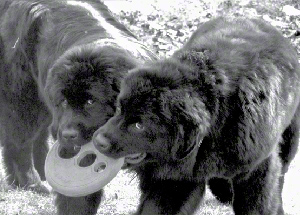In this article, I would like to outline some options for ensuring that your Newfs are cared for after you are gone. I am not an attorney, nor do I play one on TV. I am a veterinarian who, until I wrote this article, was woefully uninformed about the intricacies of pet trusts. Laws vary considerably from state to state within the US, so please consult with an experienced attorney in your area. Since I am a resident of Michigan within these United States, I will discuss this topic with a definite Yankee bias! Other countries' laws can vary even more than our individual states.
In the event that a pet outlives its owner, family members may find themselves in a predicament as to what to do with the pet or pets. The survivors may not know how to care for exotic pets, if you have them, or may not want to deal with a dog as large as a Newf or several Newfs. If you have family or a friend that is willing to take on a Newf, don't leave it to be dealt with until after the fact. Decide ahead of time where the animal should go and discuss it with that person or persons to avoid surprises after your death. Talk to the breeder of your dogs about taking them back. If your breeder is unwilling or unavailable to take the dogs, ask a training buddy. Consider how they take care of their own dogs. Will your dogs be kept in the style to which they have become accustomed? Should all of your dogs be placed in new homes? Will chronic health problems or advanced age require extra time and care? Realistically, would it be in the dog's best interest to be euthanized instead of rehomed? A word of caution, courts are very unwilling to uphold a euthanasia order if it is written out in a will. Prior arrangements with family or friends would be best in this case. Notify your veterinarian as well. If you have show or breeding dogs, do you want them to continue to be shown or bred after you are gone? If so, check the AKC rules regarding transfer of a dog after the owner's death. In addition to the number of critters some of us have, many of us have an extensive collection of crates, leads, collars, books, water gear, draft equipment, grooming utensils, and even a collection of dog related art and collectibles. Where should all of that go? How should it be dispersed? Garage sale, auction, direct gift? Should any of it be sent along with your dogs? One option is to donate via eBay's MissionFish™. Objects can be sold online with the proceeds designated to the NCA Charitable Trust.
How much money should you leave for the care of your dogs? This will vary considerably with the number of dogs that you have, their ages and the area of the country that you live in. The average cost to feed the average Newf can run from in the hundreds of dollars annually. Basic veterinary care for a young to middle-aged dog could be upwards of $1000 a year. This would depend on where you live, what the veterinary costs are in that area and possibly whether you have to use heartworm preventative or other parasite control products such as flea or tick products (that figure included heartworm preventative because we have to do that in Michigan). This is also considering that the dog is relatively healthy. So the cost to maintain the average, healthy Newf could be about $2,000 per year. For older dogs or dogs with chronic health problems, the numbers could go higher. Should grooming fees be included or will the caretaker provide grooming care? Which brings us to another consideration, should you leave extra money to compensate the caregiver for their time spent taking care of the dog? You will have to look at the time that you spend feeding; grooming, training and driving to training and then consider a reasonable hourly rate. So why bother figuring it out? Just leave a huge sum of money for the care of the dogs and be done with it. Unfortunately, courts can find that large sums of money left for the care of a pet are unreasonably high and reduce or eliminate the amount available for the pet's care.
Now that you've thought about who is to take possession of your Newf and how much money they should have to carry out your wishes, how do you make certain that it is a legally secure arrangement? Most people automatically think of using a will or setting up a trust. A provision in a will may be the most secure way to provide for your pets' futures but it is not as simple as "I bequeath my worldly possessions to my Newf, George." You can't leave property to property, and animals are considered property by the courts. You can, however, make a gift to a friend or relative and make the gift conditional on proper care of the pet. Clauses or provisions in wills can be expensive to set up, and are not always the quickest way to have funds available for the animals. If a will is contested, it could be caught up in the courts for years, thereby tying up resources for poor George.
Trusts are equally complicated. A trustee administers the trust for the benefit of the animal through a caretaker with careful attention paid to the wording of the duration of the trust. While that sounds reasonable and straightforward, you guessed it, it isn't. Some states don't recognize trusts for the support of individual animals. Of the states that do, interpretation of how the trust must be structured varies widely. The money left over in the trust after the animal dies, if any, doesn't have to go to the person administering the trust or the caretaker, either. It can go back to the estate; it can be donated to a charitable organization or to a different individual. Some trusts can be a problem in the event that you are declared incompetent or need the money in the trust. If the trust is revocable, the money can be removed from that trust for your care if you are declared incompetent. Other accounts don't have to be exhausted first so there goes the money for your dogs. If the trust is irrevocable, you can't get the money if you need it, even if you no longer have the animals that the trust was originally meant to care for. The money will go to another beneficiary after your death.
Another option could be a joint bank account with a very trusted friend with the money in the account for the care of your Newfs. Obviously, the success of this approach hinges on finding someone you trust enough to have a joint account with. If they love and care for your dogs as you would, there isn't a problem. They could, however, dispose of the dogs and keep the money. There isn't anything preventing that from happening such as can be set up with a trust. With a trust, they could dispose of the dogs, but may or may not receive the remainder of the trust themselves. There is substantially less cost to have a joint account compared to a will or trust and it is the fastest way for your dogs to be cared for in the event of your sudden death. Persons without children or other close relatives may find this a good option.
A combination approach may work best for you. Set up a joint account with the person who will ultimately end up with your dogs, leaving enough money in the account to care for the dogs for a year or two. Then have a trust or provision in your will that allows for the permanent care of the dogs. The money is in the account in the event that the will is contested, but eventually, the dogs will be cared for permanently. Any transfer of the dogs in a will or trust should be very explicit in describing those animals. Include the registered name and number, a description, any permanent identification such as a microchip or tattoo number and the veterinarian's name in the document. It is also a good idea to have this information and emergency contact names and numbers on a card that you can carry in your wallet or purse in the event you are incapacitated or worse in an accident.
If you don't have a lot of money or possessions to leave for people to care for your Newf, it isn't the end of the world. There aren't any laws that say you must provide for the dog, it just may make it more likely that the dog would be cared for, as you had hoped. It is possible to purchase term or whole life insurance to fund a trust, which can then be used for the dog's care. The policies can be inexpensive and easy to set up for younger persons, making life insurance a viable option for this group, which doesn't always have a lot of disposable income.
The decision about which option works best for you will be determined by your particular situation, your state of residency and your attorney's comfort level with estate planning. Above all else, no matter which route you decide to take, keep your plans updated with current information about your pets and the people that have agreed to take them. Don't let incorrect information needlessly complicate an already trying time.
Hopefully, this article is just food for thought and you will outlive all of your pets, avoiding the necessity of a Newfie godparent.

